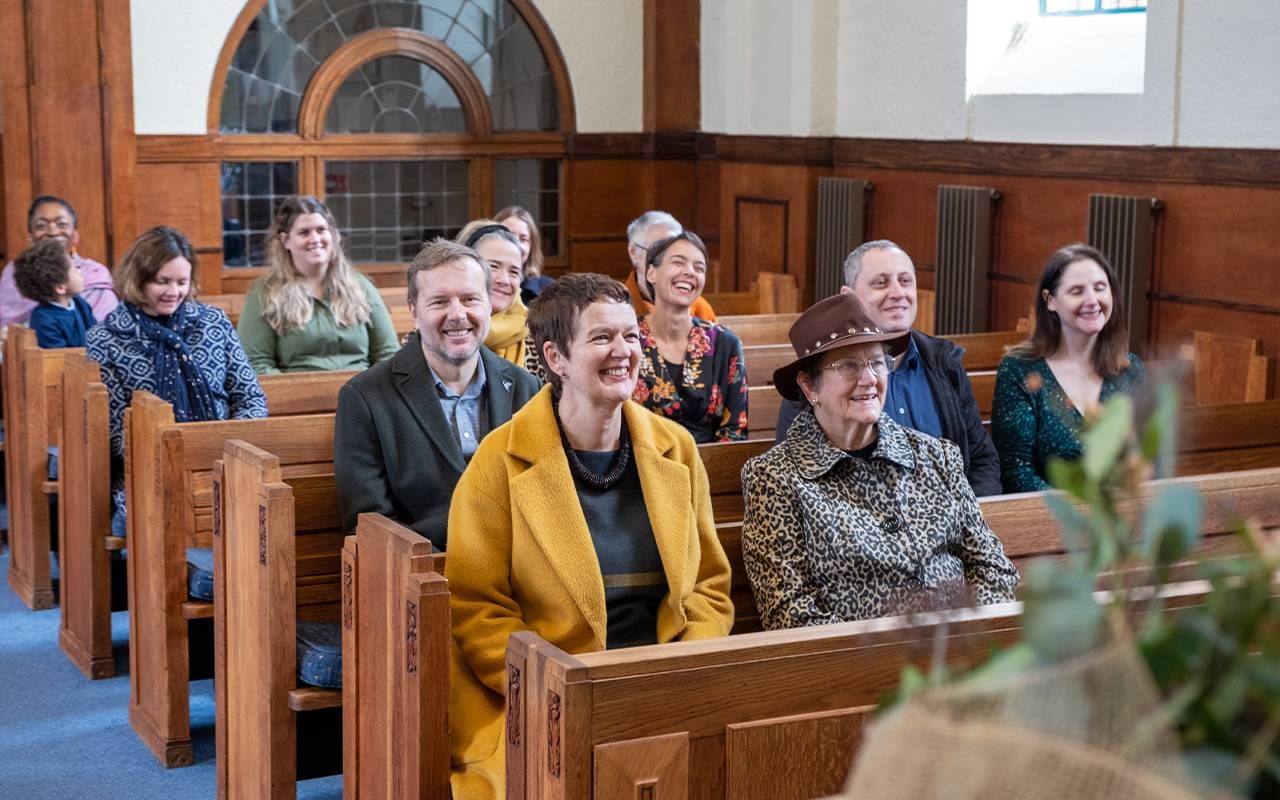Is It Okay To Laugh at a Funeral?
Humor can help heal, defuse tension and offer mourners a chance to more fully remember a loved one's life
Before he passed away, one of my father's last requests was that all three of his children speak at his funeral, and we complied.
My brother Keith began his eulogy by recalling a conversation he had with our dad right before he died. Dad had said, "When you speak at my funeral, whatever you do, don't paint me as a saint." To which Keith replied, "No problem!"

The entire room of mourners started laughing. It was true: my dad was a lot of things, but he most certainly wasn't a saint. Keith continued his eulogy with other funny stories about what it was like growing up in our house.
My brother Matt and I did the same. The three of us were sad; we were grieving, but the only way we could remember this larger-than-life man was to speak about him honestly. And honestly, he was quite a character.
The three of us were sad; we were grieving, but the only way we could remember this larger-than-life man was to speak about him honestly. And honestly, he was quite a character.
I am unsure what the funeral director thought when he peered into the room where we were eulogizing my late father. I wonder if he was perplexed to see people not just nervously chuckling but cracking up during the service. Mourners walked out of the service and said to my brothers and me, "I have never laughed so hard at a funeral."
Our goal wasn't to be irreverent, and days later, I wondered if we had memorialized him correctly. Is it okay to laugh at a funeral? Yes, the word "fun" is in there, but it shouldn't be, right? It's supposed to be a time to reflect, to be solemn and to be sad.
Not necessarily. Natalie Turner-Jones, an end-of-life doula from Missouri says, "Death, especially one that is preceded by a long illness, is stressful for loved ones. It puts wear on the nervous system and closes the heart. But remembering someone with laughter restores perspective and opens the heart."
No One Way to Grieve
Contrary to what many believe, there is no one way to grieve or specific steps to take to grieve correctly. Turner-Jones says, "Everyone processes grief differently. It's very individual to the person, the relationships and the circumstances. Scolding yourself for laughing or not crying enough is not helpful."
Earlier this year, Rabbi Ellie Miller of New Jersey officiated at a funeral. She says, "The man had Alzheimer's for many years, so essentially the family had lost him twice. It was very sad and the first few people who spoke were crying. But then the jokester son got up and he started talking about some things his dad used to do that were really funny. His mom, the grieving widow, started cackling. It was so good that on this terrible day they could recapture some of those happy memories."
"It's hard in those moments of grief to remember that it wasn't all sadness."
Miller continues, "It's hard in those moments of grief to remember that it wasn't all sadness. Laughter reminds of us of the good times and allows us to remember who the person was and not just that they died."
Turner-Jones emphasizes the importance of being true to yourself in times of grief. She explains, "At a memorial or funeral, your personal grief is on display in a very public way. Mourners may start worrying about what others think and wonder, 'Will they judge me or my relationship with the deceased by how I outwardly display my grief?' But people shouldn't critique the way they grieve or how others choose to express their grief. Instead, they should practice self-compassion and remember that everyone's body and nervous system reacts differently to loss.
Can a Eulogy Be Funny?
There is a reason that laughter is said to be the best medicine. Rabbi Matthew Gewirtz of New Jersey, author of the book, "To Build a Brave Space," says, "People may think a funeral isn't the right time for humor. But true and honest laughter lets people take a break from crying and breathe."
Of course, humor and what is considered funny is very personal. A funeral isn't a time for racy jokes and mocking the deceased. And what is considered funny to one person, or a family, may be highly inappropriate to another.
"Authenticity is the key. You want to talk about the deceased's uniqueness and humanize them."
The ultimate goal of a eulogy is to give the mourners who have gathered a tangible reminder of who the deceased was in life. "Authenticity is the key," says Turner-Jones. "You want to talk about the deceased's uniqueness and humanize them."
Gewirtz recalls a graveside funeral that a colleague officiated. The ground was soft and wet, causing the rabbi to almost fall into the hole with the casket. Gerwitz says, "A mourner remarked that it was so the deceased, who was always flirting, [wanted to] pull in this guy with her. Everyone laughed, and to this day, we still laugh thinking about it. It was natural and real; the moment resonated because it reminded us of who the deceased was during their life – flesh and blood, heart and soul."
It's Not a Roast
While a eulogy can be funny, it doesn't have to be. A eulogy isn't a toast or a stand-up act. You don't need to start with a joke or feel pressure to entertain or perform for the audience. Turner-Jones says, "If the deceased used colorful phrases or had silly quirks, it's great to talk about those funny things – be authentic. But trying to be funny in a eulogy is a burden."
Part of the reason that my brother's humorous eulogy worked so well was that it came from a place of love. My brother and my dad had a very close relationship. His words were funny, honest and heartfelt, with no trace of malice or a desire to embarrass or disparage my father's memory.
"Even when humor is expected you don't want to go too far," says Gerwitz. "There is a fear of a person drinking a few too many cocktails at a celebration of life and saying something offensive."
Humor in a eulogy is more uncomfortable if there is underlying tension. It's not a time to air grievances or share family secrets.
"You are there to honor the person in the truest sense, " says Tess Clarkson, an end-of-life doula from Missouri. "What you choose to share with people should be respectful. Telling a funny story should help mourners get to know the person who died. The speaker is expressing love through laughter and bringing the soul of their loved one to life again as they transition from this world."
What Would the Deceased Want?
Because my father was in hospice for over two months before his death, we had ample time to discuss what he wanted at his memorial service. As difficult as those conversations were, having them eased our grief. When he died, we could make decisions knowing we followed his wishes.
"Laughing tells your body that you are going to be okay. It opens your heart to more connection and leads to healing."
Turner-Jones says of the dying person, "It's hard to talk about death and dying, but when you do, you give your loved ones a gift. You take a weight off their shoulders by letting your loved ones know what you want."
Some people take this a step further, choosing to be a part of the celebration of their life. In a 2018 New York Times article, Shatzi Weisberger, 88, spoke about her involvement in the Death Positive Movement, which led her to host a "celebration of life" while she was still alive and healthy.
Weisberger dubbed it her "FUN-eral," and the event included food, music and decor. Speaking to the friends who had gathered to honor her life, Weisberger said, "There's so much more to share, but I don't want to go on — no, I really do want to go on" and everybody laughed.
Laughter Heals
There is a reason that tragic movies have scenes of comic relief. The nervous system needs a break. "Laughter relieves tension and lowers stress," says Turner-Jones. "Laughing tells your body that you are going to be okay. It opens your heart to more connection and leads to healing."
Humor also helps us to pay attention. Says Gerwitz, "Truly funny stories can draw us in and cause us to listen carefully."
The stories my brothers and I told had such vivid details people could picture my dad saying and doing these things. It was as if he was coming to life in those moments of sharing.
Ultimately, our goal wasn't to make people laugh but to help people know this unique and special man we were lucky to have as our father.


